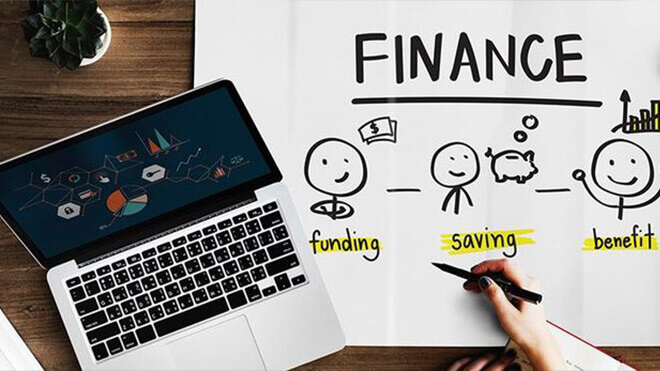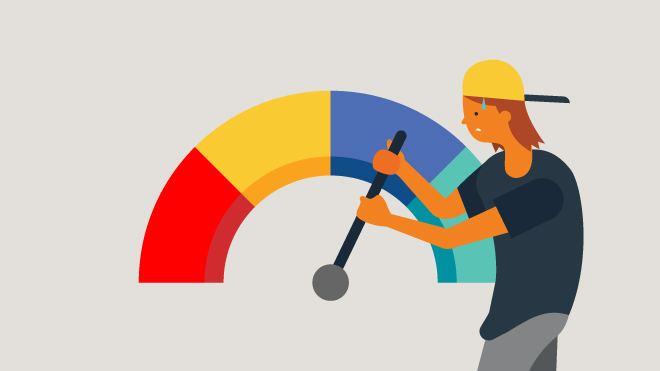
9 Steps to Plan for Financial Uncertainty
Increase your financial capability by planning for any possible money problems in the future, whether job loss, retirement account upheaval or lower income.
If your personal finances feel weighed down by worry at the moment, you're not alone. On the popular social media website Reddit, there's a phrase for it: "Money anxiety." People worry about not having enough to last through potential turmoil and feel guilty about spending money, even if they have enough.
Plenty of financial policy uncertainty is going around in 2025, feeding that anxiety.
Economic research reveals that consumer confidence has dropped. Consumer confidence often reflects consumers' assessment of current business and labor market conditions. Some recent consumer numbers signal a possible upcoming recession or decreasing economic activity.
Consumer debt has increased, too, with balances up on credit cards, auto loans, mortgages and HELOCs, according to the most recent 2025 Experian data. So, for many, it's not simply anxiety. It's a real-world struggle where making ends meet is getting harder, despite turning to borrowing.
In all, Experian estimates the per-person average debt balance at $105,056 across seven types of debt. The Experian report recognizes that all consumers don't carry each debt type, and average debt amounts vary by state. For example, Washington residents have among the highest average debt balances at $150,423.
People are having a harder time managing debt amid turmoil: "Americans are collectively carrying a record-high amount of debt," said BECU Lead Financial Educator Stacey Black.
Takeaways: Planning for Financial Uncertainty
- Don't make sudden changes or big financial decisions without careful consideration and planning.
- Collect your financial information and review your spending.
- Make an emergency monthly budget plan.
- Build your emergency or rainy-day fund.
- Review your debt and learn about your options.
- Review your insurance coverage and investment status.
A Roadmap to Financial Confidence
When faced with new financial crises like a job loss or big expense hike, it can feel urgent to make quick, big decisions in turn. Before you spring into action, Black advises that you pause and take a breath. Better yet, think about where you are long before a crisis arrives.
A plan can help you maximize your resources before money troubles begin. You're putting yourself in the best position for a favorable financial situation.
1. Collect Information for Financial Health
Collect all the pieces of your financial life, including:
- Bank or credit union account numbers and balances.
- Retirement account information.
- Insurance accounts, including auto, life, health and home.
- Credit score and history.
- Debts owed, including account numbers, interest rates, minimum monthly payments and payoff amounts.
Once you have all the pieces identified, it's up to you to determine the best format to put them together, whether a paper binder or an electronic folder on your computer.
The location of the pieces doesn't matter as much as having the full picture. Ensure your information is somewhere secure and only you and your trusted loved ones know how to access it.
2. Review Your Spending Patterns
- Look at your daily spending habits, routines and patterns, including:
- Percentage of your cash that goes toward living expenses, such as housing and utilities.
- When you are most tempted to get lunch on the run with friends versus regular extras.
- Automatic payments you may have forgotten about, such as subscriptions.
Track spending by noting purchases or accessing your online banking transactions. Some financial institutions like BECU offer tools like Money Manager, an online budgeting tool. A simple spreadsheet can work, too. Categorize expenses by type, such as groceries, utilities, clothing and streaming subscriptions.
"Looking at your list, you can start to see patterns and may be able to identify areas where you're spending more than you want or need to," Black said.
BECU members can schedule a free Financial Health Check if they need help reviewing their monthly budget.
"Developing a budget is a lifelong practice that will provide value for years to come and can ease money stress," Black said. "If you don't already have a budget, it's important to start building one now so you are more prepared for changes in the future."
3. Prep Your Emergency Budget to Maximize Cash Flow
An emergency budget uses your everyday budget (or basic understanding of what you're spending now) to identify where to cut back when times get tight. You'll focus your spending on living expenses and minimum payments.
You'll prioritize essentials, such as housing, utilities and food. You might need to pay only the minimum monthly payments due on debts if that's all you can afford."
This will also help you see if there are ways to momentarily cut or pause nonessential spending," Black said. "For example, I temporarily paused a monthly movie subscription and put that money towards my savings instead."
She suggests either pausing or canceling unused subscriptions (streaming services, gym memberships) or recurring fees for services you can live without, at least temporarily.
Doing this in advance can help you transition to using your emergency budget more seamlessly if necessary.
4. Build Your Emergency Fund
An emergency fund is an account with money for unpredictable events, like medical bills or urgent home or car repairs. This money is kept "liquid" or readily accessible in a savings account, Black said.
You can use an emergency fund to avoid new credit card expenses or personal loans. It's crucial to avoid tapping the fund for impulse buys or planned big-ticket items, such as a new washing machine (unless it dies unexpectedly).
Black recommends setting a goal to save at least six to nine months' worth of expenses — but remember that it may take years to save that much. Even three to six months is a good start.
"Automatic savings plans can be a set-it-and-forget-it step toward building great savings habits," Black said. Saving a good portion of a bonus or tax refund is another way to kick-start an emergency fund.
"What's most important is to save something," she said. "You can start small. Maybe try to save $500. Once you hit that goal, increase it a little."
Black suggested that you can make your money work harder by looking for higher-yield options like money market accounts.
Certificates of deposit also might earn more interest than a traditional savings account in exchange for leaving the money in the CD for a designated term. Keep in mind that in a true emergency, you'd have to close the CD before it matures to access your funds. Make sure you understand your financial institution's conditions and the consequences, including any penalties, for making an early withdrawal before you choose this option for emergency savings.
5. Understand Your Debt, Including Credit Card Debt
Review your major credit card, student loans, car loans, mortgage and other debts. In the future, if you're unable to make your loan payment or are facing significant financial stress, contact your lender right away.
"If your income has been interrupted, consider reaching out to your lenders to see if they are willing to work with you on changing due dates, reducing your payments or delaying them for now," Black said.
If you're in a difficult situation, carefully approach big debt-related decisions like paying bills with credit cards or taking out new loans. Experian data from 2025 shows the average consumer balance has increased across credit cards, mortgages and car loans.
"It's important to take the time you need to do your research, so you know what you're getting into before making any large financial commitments," Black said.
In addition, reducing any debt owed now could free up more money if you need it later. A debt calculator, like BECU's interactive debt calculator tool, can help you see if you can save through lower interest rates or consolidation. BECU members can also call GreenPath Financial Wellness counselors for debt counseling, housing and student loan counseling, or an opportunity to consolidate debt.
Black advised using caution if you choose the debt consolidation route: "Be sure you have control over your spending habits and a clear understanding of your essential expenses," Black said. "Otherwise, you might end up with even more debt than you started with."
6. Manage Investments and Financial Goals
If you haven't started yet, take full advantage of matching employer-sponsored retirement plan contributions, for example in a 401(k) or 403(b), Black suggested.
If you're nearing retirement, you're likely monitoring your investment portfolio and retirement accounts closely — maybe even daily. Those with more time left in the workforce should review allocations every few years.
According to surveys from Vanguard (PDF) and Bank of America (PDF), more workplace retirement plan participants in 2024 took a "hardship withdrawal," although still uncommon. Hardship withdrawals can be used for medical, funeral and some tuition expenses. Some participants are also borrowing against their 401(k) retirement accounts.
Other recent news points to people moving into lower-risk, lower-return investments out of concern about more market turmoil in the future.
But making big changes in your retirement savings plan can create long-term consequences not worth the short-term payoff. In uncertain economic times, talk to an expert who can help you make the best decisions for your situation.
"During times like this, it can be difficult to stay focused and calm," Black said.
When possible, explore other avenues for financial security before options that pull from vital long-term savings. You can also attend free financial webinars and seminars with BECU to consider planning for retirement and for distribution of assets after death.
7. Review Your Insurance for Financial Stability
Insurance helps provide a measure of protection for a worst-case scenario, such as a car accident, house fire or medical emergency. Review your insurance documents and instructions on how to access benefits if you need them. These insurance documents could include:
- Health insurance
- Life insurance
- Auto insurance
- Home insurance
- Pet insurance
Look at your policy's limits and rules to ensure you're covered for an emergency situation and have enough to pay your deductibles. You might also research supplemental policies for damage your homeowners' policy probably doesn't cover, such as earthquake or flood insurance.
If bad luck strikes or you need to shop for a new policy, you'll have your policy information at hand. You can also prepare for any worst-case scenario by comparing your options. For example, with health insurance, you can speak with a licensed health insurance agent to investigate:
- Marketplace or Affordable Care Act health plan: For those without an employer plan, with subsidies that could reduce monthly premiums
- ACA Catastrophic plans: For people who qualify due to age or income
- Medicaid (Apple Health): For lower-income people and certain other groups
- Medicare: For those over 65 and with some medication qualifications
- COBRA: Extending your employer's plan after layoff
8. Make Note of Helpful Resources
All the planning in the world can't prevent some financial surprises and emergencies. Remember that there are resources available to help you navigate losses.
Make a note of organizations and government agencies that can help with the following:
- Food
- Unemployment assistance
- Housing
- Medical assistance
9. Build a Network of Support
Talk about your financial plans (steps 1-8) with your trusted loved ones. Discuss options with them and explore a variety of scenarios. Keeping an open dialogue ensures you're all on the same page, which allows you to act faster if and when the unexpected occurs.
Give your loved ones a list of the financial professionals you use who can help execute the steps of your plan. Work with your financial and legal advisors to ensure the right people have access to your accounts in case of emergencies.
FAQ
What Are Some Common Financial Problems People Might Face?
People face personal financial challenges and emergencies every day, which could include:
- Loss of job or self-employment income
- Unexpected illness
- Medical emergency
- Loss of or change of insurance
- Need to care for someone else, such as a parent or loved one
- Falling victim to a fraud or scam
- Sudden increase in expenses, such as a mortgage balloon payment or end of student loan forbearance
Building a savings account and reducing debt can help prepare you for significant changes in your everyday life and potential crises.
What's the Relationship Between Financial Challenges and Mental Health?
Money problems might lower your self-esteem and could even harm your mental health. Several recent studies found a relationship between higher concerns about financial health and increased levels of psychological distress. Financial health concerns were specifically high around debt, such as credit card debt or mortgage debt.
If you're concerned about your mental health or experience suicidal thoughts, call 988 to contact the 988 Suicide & Crisis Lifeline.
How Can Financial Markets Impact Economic Activity for Businesses and Consumers?
Higher prices for stocks and other equities might boost consumer and business spending, according to an analysis by a Federal Reserve Bank of Kansas City economist. The economist suggested this is because stocks are thought to predict future economic trends, including income.
Similarly, stock market losses may cause the average consumer and business to cut spending, worried about future income or job loss. This pessimism, in turn, can eventually contribute to broader economic challenges, such as a recession.
Although the article states that the impact on the economy likely isn't significant, others posit that wealthier consumers who are reliant on stocks might cut back on spending, and those consumers now make up a large proportion of the overall economy. People concerned about saving enough for retirement could reduce spending as well.
The above article is intended to provide generalized financial information designed to educate a broad segment of the public; it does not give personalized financial, tax, investment, legal, or other business and professional advice. Before taking any action, you should always seek the assistance of a professional who knows your particular situation when making financial, legal, tax, investment, or any other business and professional decisions that affect you and/or your business.







